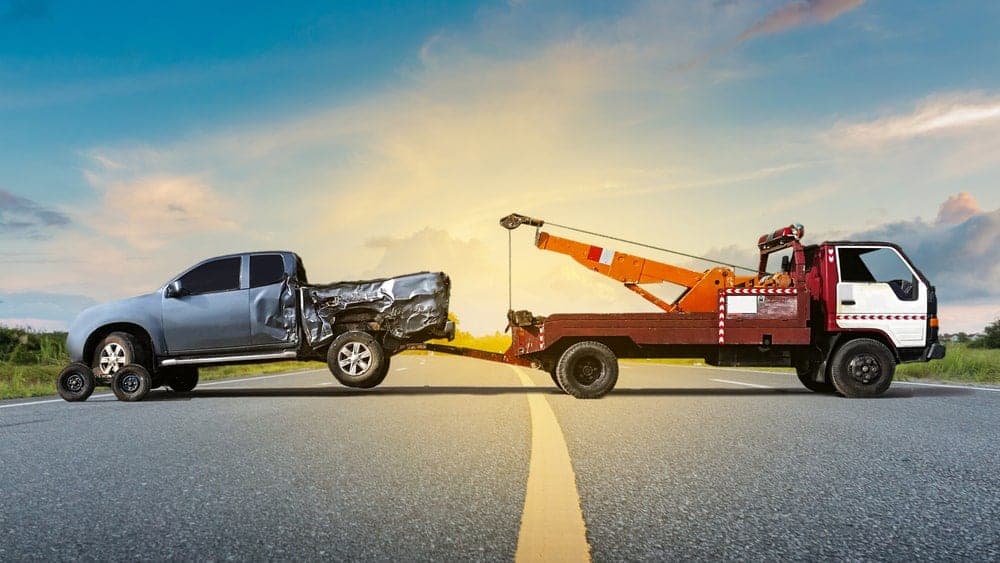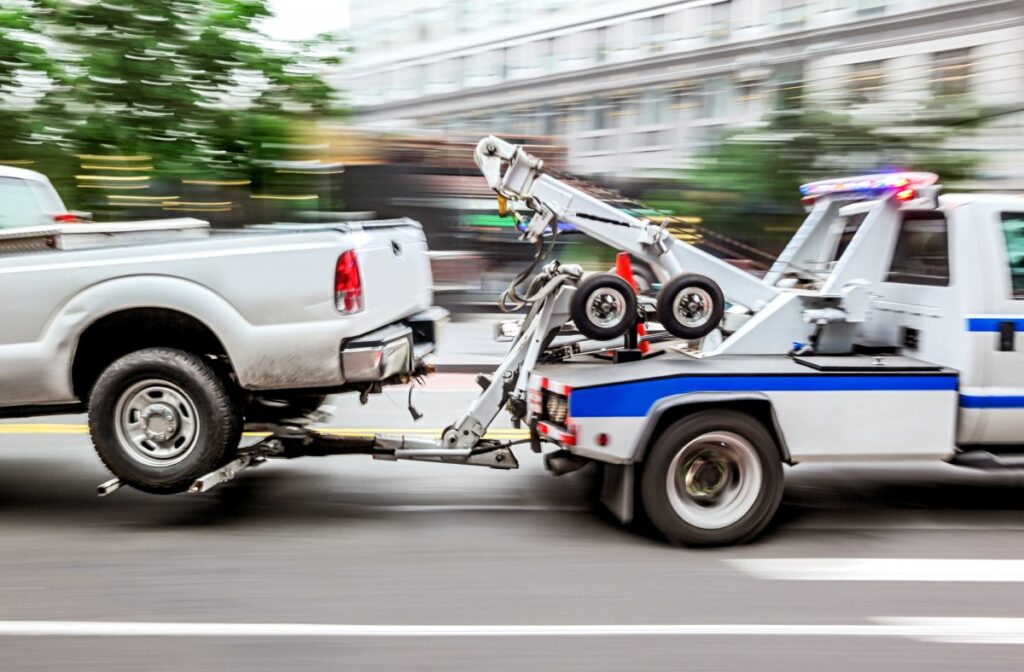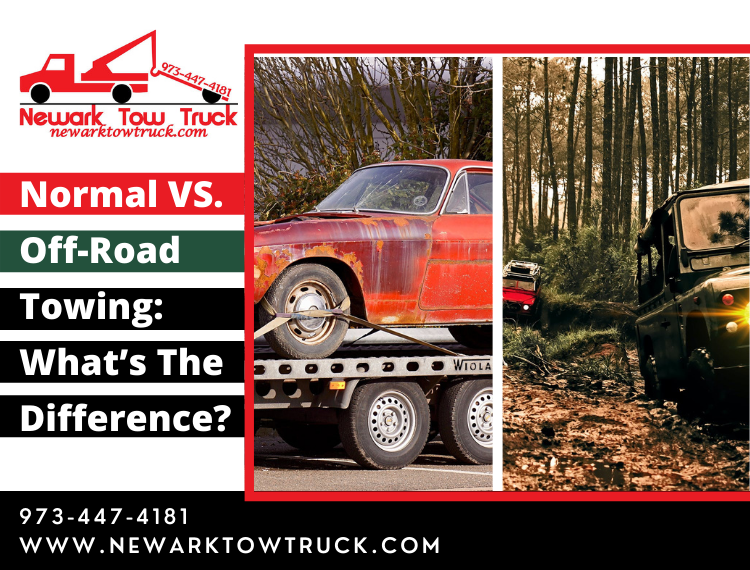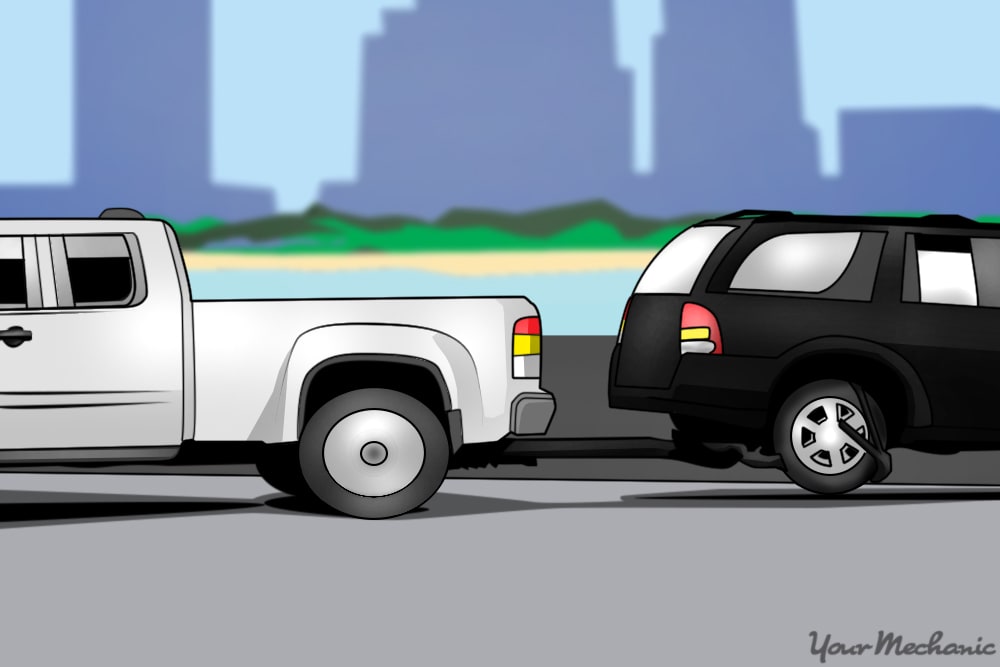In the world of automotive transportation, towing plays a crucial role in assisting vehicles that have encountered unexpected setbacks on the road. Nevertheless, have you ever wondered what exactly constitutes “normal towing”? This article aims to shed light on the definition and significance of normal towing, exploring its various aspects and providing valuable insights into this often overlooked aspect of the automotive industry. From understanding the different types of towing to the importance of professional towing services, prepare to embark on a journey that elucidates the essence and relevance of normal towing in today’s fast-paced world.

This image is property of www.mach1services.com.
Definition of Normal Towing
Normal towing refers to the process of moving a vehicle from one location to another using a tow truck or other towing equipment. This service is typically utilized when a vehicle breaks down, is involved in an accident, or needs to be transported for various reasons. Normal towing involves securely attaching the vehicle to the tow truck and safely transporting it to its designated destination.
Types of Towing Services
Emergency Towing
Emergency towing is required when a vehicle breaks down unexpectedly or is involved in an accident that renders it inoperable. This type of towing service is available 24/7 and is often provided by towing companies with quick response times. Emergency towing ensures that stranded motorists can have their vehicles promptly towed to a repair shop or a safe location.
Flatbed Towing
Flatbed towing involves using a tow truck equipped with a flatbed that can be hydraulically inclined and lowered to the ground. The vehicle to be towed is driven onto the flatbed or loaded onto it using a winch. This method is generally considered safer as the entire vehicle is securely placed on the flatbed, reducing the risk of damage during transit.
Wheel-Lift Towing
Wheel-lift towing utilizes a tow truck equipped with a metal yoke that slides beneath the front or rear wheels of the vehicle to be towed. The yoke is then lifted, raising the wheels off the ground. This type of towing is often used for vehicles with flat tires or those that cannot be driven. Wheel-lift towing requires extra caution to ensure the vehicle remains stable during transportation.
Hook and Chain Towing
Hook and chain towing, also known as sling towing, is an older method where the tow truck uses a chain or strap to connect to the frame or axle of the vehicle being towed. This type of towing is less commonly used today due to concerns about potential damage to the towed vehicle’s body. However, it may still be employed for certain situations, such as moving immobile vehicles short distances.
Integrated Tow Truck
An integrated tow truck, also referred to as a wrecker, is a specialized vehicle that combines the capabilities of a tow truck and a recovery vehicle. These trucks are equipped with a boom, winch, and other accessories, allowing them to tow larger vehicles such as buses, recreational vehicles (RVs), and construction equipment. Integrated tow trucks are often used for heavy-duty towing and recovery operations.

This image is property of lemonbin.com.
Understanding Normal Towing
Objectives of Normal Towing
The primary objectives of normal towing are to safely transport a vehicle, prevent further damage or accidents, and ensure the convenience of the vehicle owner. When a vehicle breaks down or is involved in an accident, normal towing aims to provide a reliable and efficient solution to move the vehicle to a repair facility, a designated storage space, or to the vehicle owner’s preferred location.
Factors That Determine Normal Towing
Several factors determine the appropriate method of normal towing for a specific situation. These factors include the condition of the vehicle, its size and weight, the availability of towing equipment, the distance to be covered, and any special requirements or regulations. Assessing these factors helps towing professionals determine the most suitable towing method to ensure the safe and efficient transportation of the vehicle.
Determining the Right Towing Method
Selecting the appropriate towing method requires consideration of various factors. For example, flatbed towing is often preferred for vehicles with low ground clearance or those that have sustained significant damage. Wheel-lift towing may be more suitable for smaller vehicles or those with minor mechanical issues. The towing service provider will evaluate the specific needs and condition of the vehicle to determine the best towing method that offers both safety and convenience.
Equipment Used in Normal Towing
Tow Trucks
Tow trucks are the primary vehicles used in normal towing services. These specialized trucks are equipped with various towing mechanisms, such as flatbeds, wheel-lifts, or integrated towing capabilities. Tow trucks come in different sizes and configurations to accommodate a wide range of vehicles, from compact cars to heavy-duty trucks. They are designed to provide stability, power, and the necessary features for safe and efficient towing operations.
Towing Accessories
In addition to tow trucks, various towing accessories are used to ensure the secure attachment and transportation of the vehicle. These accessories include towing straps, chains, winches, and safety lights. Towing straps and chains provide a strong connection between the tow truck and the vehicle, while winches assist in loading vehicles onto flatbeds or lifting them during wheel-lift towing. Safety lights help alert other motorists to the presence of a towed vehicle, enhancing overall safety during the towing process.

This image is property of www.hollywoodtowing.com.
Safety Considerations in Normal Towing
Secure Attachment of the Vehicle
Ensuring the secure attachment of the towed vehicle is of utmost importance in normal towing. Properly securing the vehicle minimizes the risk of detachment during transit and potential accidents. Towing professionals carefully follow manufacturer guidelines and use appropriate attachment points to secure the vehicle. Regular inspections of the towing equipment, including straps, chains, and connections, are conducted to identify and address any issues that may compromise the security of the towed vehicle.
Safe Towing Techniques
Safe towing techniques are essential to prevent damage to the towed vehicle and avoid accidents on the road. Towing professionals undergo rigorous training to develop the skills necessary for safe towing operations. They are proficient in maneuvering the tow truck with a loaded vehicle, maintaining a safe distance from other vehicles, and adhering to traffic rules and regulations. Towing speeds are adjusted according to road conditions and the weight of the towed vehicle to ensure optimal safety during transportation.
Properly Loading the Vehicle
Loading the vehicle onto the tow truck in the correct manner is crucial for safe towing. Towing professionals consider the weight distribution of the vehicle and ensure that it is evenly balanced on the tow truck or flatbed. This prevents excessive strain on the tow truck and ensures stability during transit. Additionally, specific precautions are taken to avoid damaging the vehicle’s undercarriage, suspension, or other vulnerable parts.
Choosing the Right Towing Service
Reputation and Experience
When selecting a towing service, consider the reputation and experience of the company. Look for service providers with a proven track record of providing reliable and professional towing services. Reading customer reviews and seeking recommendations can help assess the reputation of a towing company. An experienced towing service will have a deep understanding of the industry, be equipped with the necessary skills and equipment, and provide efficient and effective solutions to meet customers’ needs.
Insurance Coverage
It is vital to ensure that the towing service provider has adequate insurance coverage. This protects both the vehicle owner and the towing company against any liabilities and ensures that any potential damages or losses during the towing process will be properly compensated. Before engaging a towing service, verify the extent and validity of their insurance coverage, and clarify any specific terms and conditions related to liability and claims.
Response Time
Response time is a critical factor when it comes to towing services, especially during emergency situations. Prompt assistance can help alleviate stress and ensure that the vehicle is quickly attended to. Look for a towing service that offers fast response times and operates 24/7. Reliable towing companies prioritize customer calls and dispatch their trucks promptly to provide timely assistance, regardless of the time of day or night.
Availability of Services
The availability of towing services is also an important consideration. Choose a towing company that offers a broad range of services to cater to diverse towing needs. This ensures that regardless of the type of vehicle or the specific situation, the towing service provider will have the necessary equipment and expertise to handle the towing requirements. From light-duty to heavy-duty towing, recovery services, and transportation of specialized vehicles, a towing company with comprehensive services can provide a one-stop solution.
This image is property of res.cloudinary.com.
Cost of Normal Towing
Factors Affecting Towing Costs
Several factors contribute to the overall cost of normal towing services. These factors include the distance to be covered, the type and weight of the vehicle, the specific towing method employed, the complexity of the towing operation, and any additional services required, such as winching or off-road recovery. Each towing situation is unique and may involve different variables that influence the final cost.
Typical Price Ranges
The price range for normal towing services can vary significantly depending on the factors mentioned above. Generally, towing fees are determined based on a combination of distance and weight. Short-distance, light-duty towing tends to be less expensive, while long-distance or heavy-duty towing may involve higher costs. It is advisable to get a quote from the towing service provider before engaging their services to ensure transparency and avoid any surprises regarding the final cost.
Frequently Asked Questions
What are the common reasons for needing towing services?
Common reasons for needing towing services include vehicle breakdowns, accidents, running out of fuel, flat tires, engine failures, and being stuck in unfavorable road conditions. Towing services are designed to provide assistance in situations where a vehicle cannot be driven safely or is immobile.
Can any vehicle be towed?
Tow trucks and towing equipment are designed to accommodate a wide range of vehicles, from motorcycles and passenger cars to trucks and even heavy machinery. However, certain factors, such as the vehicle’s size, weight, and condition, may influence the choice of towing method or require specialized towing equipment for safe and effective transportation.
What should I do if my car breaks down on the road?
If your car breaks down on the road, it is essential to prioritize your safety and that of other motorists. Move your vehicle to the side of the road if possible and turn on your hazard lights. Contact a reputable towing service for assistance and explain your situation to them. Follow any instructions provided by the towing service or law enforcement officials and wait in a safe location until help arrives.
Is normal towing covered by insurance?
Insurance coverage for normal towing services may vary depending on the specific insurance policy and the circumstances leading to the need for towing. Some insurance policies include emergency roadside assistance or towing coverage, while others may offer it as an optional add-on. It is advisable to review your insurance policy or contact your insurance provider to understand the extent of towing coverage available to you.

This image is property of newarktowtruck.com.
Tips for a Successful Towing Experience
Preventive Vehicle Maintenance
Regularly maintaining your vehicle can significantly reduce the chances of requiring towing services. By following the manufacturer’s recommended maintenance schedule, addressing mechanical issues promptly, and ensuring the vehicle’s overall health, you can minimize the risk of breakdowns or accidents, providing you with a smoother and uninterrupted driving experience.
Knowledge of Local Towing Regulations
Familiarize yourself with the towing regulations and laws in your local area. Understand the requirements and restrictions related to parking, emergency towing, and roadside assistance. Being aware of these regulations can help you make informed decisions when choosing a towing service and ensure compliance with local laws during towing operations.
Keeping Emergency Contact Information
Maintain a list of emergency contact numbers, including reliable towing services, roadside assistance providers, and law enforcement agencies. This list can be invaluable in an emergency situation, allowing you to quickly reach out for assistance and obtain the necessary support to mitigate any vehicle-related issues.
Preparing for Potential Breakdowns
Prepare an emergency roadside kit and keep it in your vehicle. This kit should include essentials such as a flashlight, jumper cables, a spare tire, a jack, basic tools, and a first aid kit. Familiarize yourself with the functionality of these tools and ensure they are in good working condition. Additionally, carry emergency supplies such as water, non-perishable food, blankets, and a reflective vest to ensure your safety and comfort in the event of a breakdown or accident.
Conclusion
Normal towing services play a crucial role in ensuring the safe and efficient transportation of vehicles in various situations. By understanding the different types of towing services, the factors that determine the appropriate towing method, and the considerations involved in the process, vehicle owners can make informed decisions when choosing a towing service. Prioritizing safety, reputation, and experience, as well as being aware of the cost and insurance coverage, allows vehicle owners to have a successful towing experience when the need arises. With proper preparation, knowledge, and reliance on reputable towing service providers, normal towing can provide a reliable solution to address unexpected vehicle issues and ensure peace of mind for vehicle owners.

